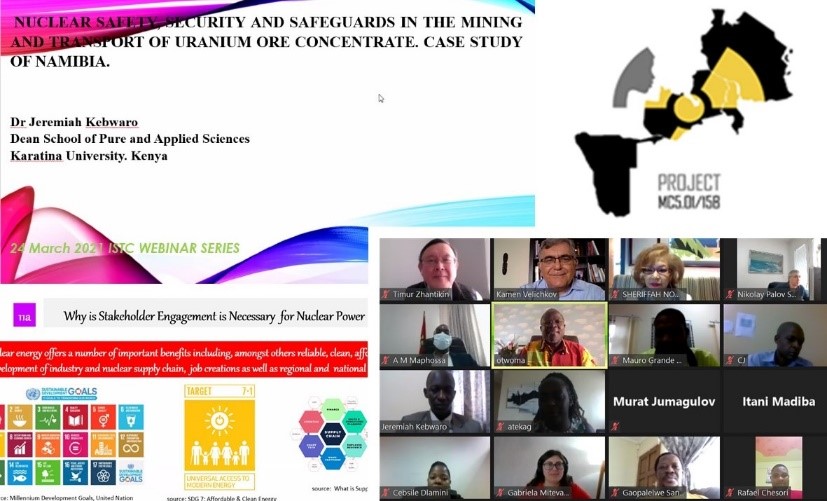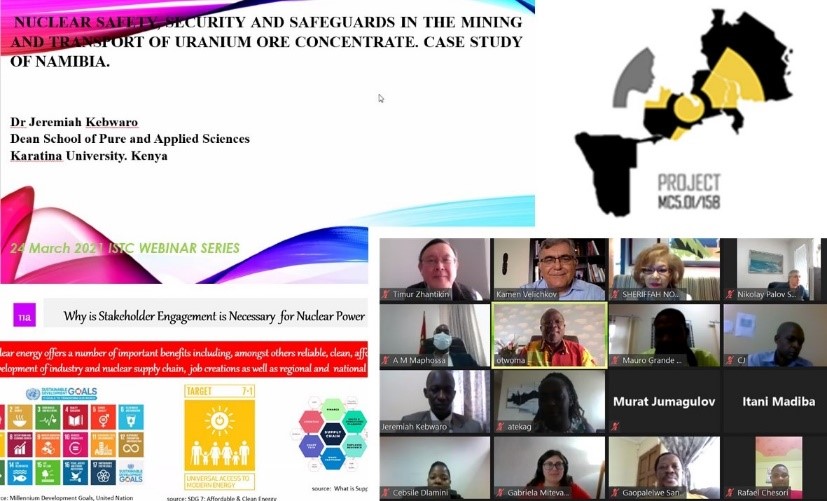Experts from 17 Countries Discuss Stakeholders’ Engagement in Nuclear Safety and Safeguards at an ISTC webinar

 Representatives of national regulators, academia, and civil society from 17 countries across three continents took part in the third of a series of webinars underEU- funded project MC 5.01 15B Support to Southern African States in Nuclear Safety and Safeguards. On 24 March 2021, they took stock of the elaboration of the country specific reports under the Project and listened to Dr. Jeremiah Kebwaro, from the Department of Physical and Biological Sciences at Karatina University in Kenya presenting the report on Namibia. The report is titled Nuclear Safety, Security and Safeguards in The Mining and Transport of Uranium Ore Concentrate in Namibia. Much of its findings and conclusions are based on available open sources, including reports from mining companies. Dr. Timur Zhantikin, Director, Kazakhstan Nuclear Power Plants, made valuable comments and recommendations based on the vast experience of Kazakhstan, a country, which is a world leader in Uranium production and export. The ensuing discussion turned into experience sharing, especially beneficial as orientation for authors who are working on other country-specific reports. Ms. Segakweng Tsiane, consultant, former Principal Secretary with the Ministry of Defence in Botswana, commented on the prospects for her country to licence companies for Uranium mining and to build a stronger regulator. Nikolay Palov, CEO of Software Company (SC) Ltd. and Gabriela Miteva, Senior expert with SC took part in the discussion from the standpoint of the provider of the Information Tracking System – the key technical product under project MC 5.01 15B for monitoring the transportation of radioactive materials within and across Southern African countries.
Representatives of national regulators, academia, and civil society from 17 countries across three continents took part in the third of a series of webinars underEU- funded project MC 5.01 15B Support to Southern African States in Nuclear Safety and Safeguards. On 24 March 2021, they took stock of the elaboration of the country specific reports under the Project and listened to Dr. Jeremiah Kebwaro, from the Department of Physical and Biological Sciences at Karatina University in Kenya presenting the report on Namibia. The report is titled Nuclear Safety, Security and Safeguards in The Mining and Transport of Uranium Ore Concentrate in Namibia. Much of its findings and conclusions are based on available open sources, including reports from mining companies. Dr. Timur Zhantikin, Director, Kazakhstan Nuclear Power Plants, made valuable comments and recommendations based on the vast experience of Kazakhstan, a country, which is a world leader in Uranium production and export. The ensuing discussion turned into experience sharing, especially beneficial as orientation for authors who are working on other country-specific reports. Ms. Segakweng Tsiane, consultant, former Principal Secretary with the Ministry of Defence in Botswana, commented on the prospects for her country to licence companies for Uranium mining and to build a stronger regulator. Nikolay Palov, CEO of Software Company (SC) Ltd. and Gabriela Miteva, Senior expert with SC took part in the discussion from the standpoint of the provider of the Information Tracking System – the key technical product under project MC 5.01 15B for monitoring the transportation of radioactive materials within and across Southern African countries.
Ms. Sheriffah Noor Khamseah, Innovation & Nuclear Advocate, Alumna, Imperial College, University of London made a presentation on Stakeholders Engagement for Nuclear Power. She covered key topics highlighting Africa’s nuclear power ambitions, the IAEA Milestone Approach in the development of a national infrastructure for nuclear power, the key role of a Nuclear Power Program Implementing Organization (NEPIO) in stakeholder engagement. Special attention was attributed to surveys of public opinion to determine the degree of knowledge and receptiveness to the local use of nuclear power. The presenter suggested that it may be beneficial to develop appropriate communications tools using both traditional and social media based on demographic segmentation covering amongst others age, gender, and occupation. The moderator of the discussion, Dr. David Otwoma, Chief Analyst and Deputy Director of the National Commission for Science Technology and Innovation shared the experience of Kenya from the legal and institutional process in the establishment of the national NEPIO.
The next edition of the ISTC series of webinars will be conducted on 21 April 2021. In addition to the stakeholder engagement topics, the agenda will comprise the presentation and discission on the country-specific report on Zambia.
More information may be retrieved here

